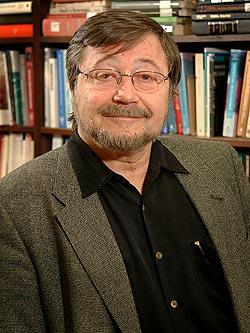
The ability to learn and form conclusions from a constant flow of experience may be built into human brains, but programming it into a computer requires solving exceedingly difficult questions about how to store the machine's experience and use it efficiently. A central problem is that input from the senses is incomplete and ambiguous. Computer learning and reasoning, therefore, needs to weigh the evidence accurately when considering different conclusions. Judea Pearl's work laid the foundation for just this kind of artificial intelligence, by proposing methods for representing statistical associations between many pieces of information, for making accurate predictions from that information and for inferring causal connections between events. His research changed the face of computer science.
Pearl was born in 1936 in Tel Aviv, Israel. He earned his B.S. in electrical engineering from the Technion in Haifa, Israel in 1960 and went on to earn a master's degree in physics from Rutgers University in 1965 and his Ph.D. in electrical engineering the same year from the Polytechnic Institute of Brooklyn. He worked at RCA Research Laboratories in Princeton until 1970 and has been at the University of California, Los Angeles [UCLA] ever since.
Since 1984 Pearl has written three fundamental books in artificial intelligence. In the first, Heuristics: Intelligent Search Strategies for Computer Problem Solving, Pearl took on heuristic algorithms - methods for quickly finding a "good enough" answer, rather than searching forever for a perfect answer -and suggested ways to achieve a higher standard of success. In Probabilistic Reasoning in Intelligent Systems: Networks of Plausible Inference, published in 1988, Pearl develops a seminal approach, Bayesian networks, for representing and reasoning efficiently with a large number of pieces of uncertain evidence. Bayesian networks have now been used everywhere in science and engineering, from medical diagnosis to email spam detection. His third book, Causality: Models, Reasoning, and Inference (2000), rejects the academics' timidity in jumping from correlation to causation and sets up rigorous ways for determining causal relationships. By presenting a set of precise reasoning rules that can show causation from an observation, Pearl defied convention by showing that correlation can indicate causation.
Pearl is the president of the Daniel Pearl Foundation. His numerous scientific honors include the Allen Newell Award, the Lakatos Award in the philosophy of science, the International Joint Conferences on Artificial Intelligence [IJCAI] Research Excellence Award and he is a member of the National Academy of Engineering.
Information as of April 2008

